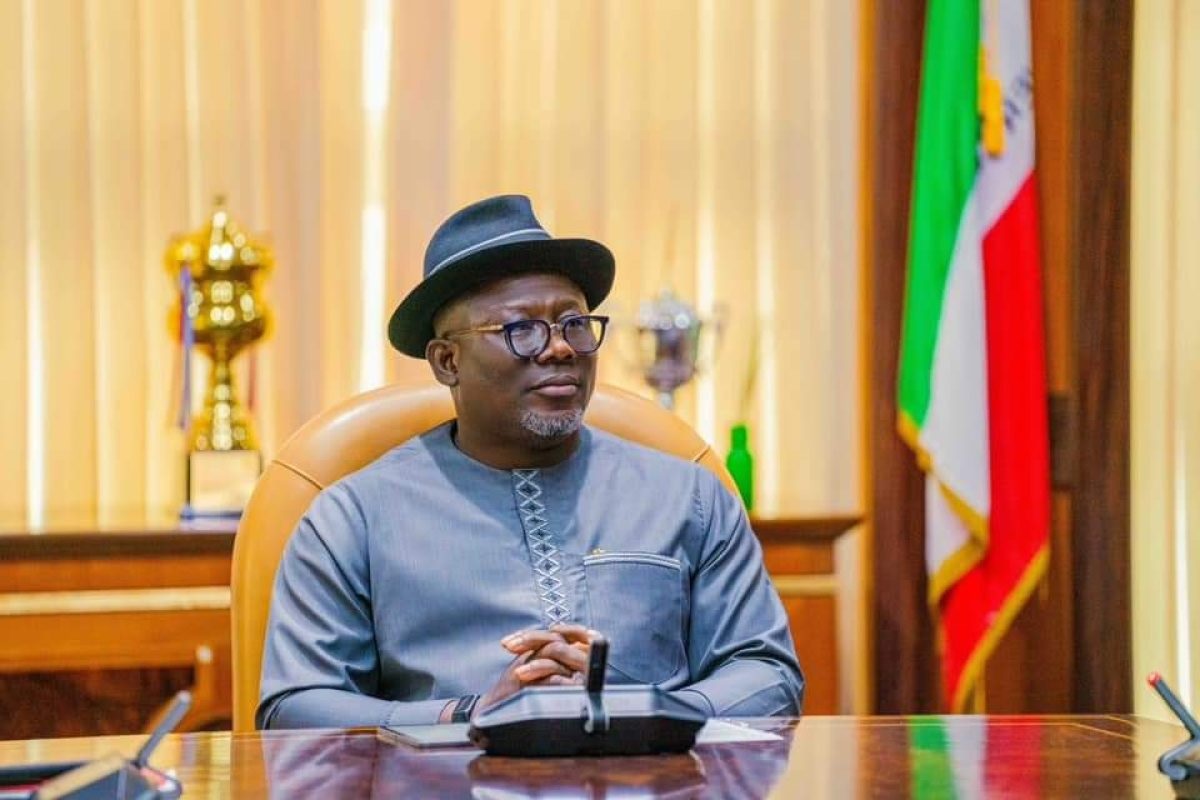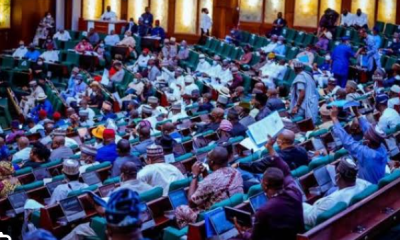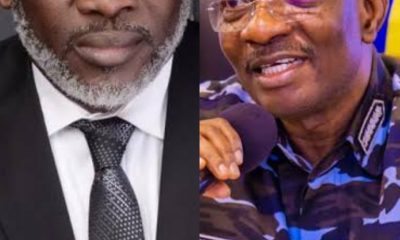News
BREAKING ! IGP Egbetokun sacks 197 officers for bypassing regulations, forgery

The Nigerian Inspector General of Police Kayode Egbetokun has ordered the immediate retirement of senior police officers who are either over 60 years old or have served for more than 35 years.
These include Simon Lough, SAN, the Head of the NPF Legal Section and Benneth Igweh, a former Federal Capital Territory Police Commissioner.
These police officers have been implicated in forgery, falsification, and bypassing service regulations.
The directive is disclosed in a letter dated February 1, 2025, signed by CP Bode Akinbamilowo, Deputy Force Secretary, on behalf of the Inspector General of Police, and addressed to the Deputy Inspectors-General of Police, Assistant Inspectors General of Police, Commandants of Police Staff Colleges at Jos and Kano, Commissioners of Police and Commandants of Police Colleges across the country.
The letter is titled ‘Re: Police Service Commission Decision At Its 1stt Extra Ordinary Meeting Of The 6thh Management Board On The Regularisation Of Date Of First Appointment Of Cadet ASPs/Inspectors Force Entrants.’
It reads, “Attached letter No. CH: 8400.IGP.SEC/ABJ/VOL.17/90 dates 31st January, 2025 with its attachments received from the Inspector General of Police, Force Headquarters Abuja in respect of the above underlined subject refers.
“I am to convey the directive of the Inspector General of Police that you ensure comprehensive implementation of the decision with emphasis on paragraphs 3 and 4 of the attachment letter under reference.”
The decision of the PSC refereed to in the letter was earlier communicated to the IGP in a letter dated January 31, 2025 and signed by Nnamani Onyemuche, Secretary to the PSC.
Paragraphs 3 and 4 to be given emphasis read: “Accordingly, the Commission at its 1st extraordinary meeting of the 6th Management Board held on Friday 31st January 2025 has approved the immediate retirement of those officers who have spent 35 years in service and those above 60 years of age.
“Any omission discovered subsequently on this issue also falls within this approval.”
Paragraph 5 reads: Please implement, inform the affected officers and make replacement for the vacancies thereafter immediately and forward to the commission for its consideration and approval.”
On the list of those who should have retired but still in service going by their dates of enlistment are: Simon Asamber Lough who should have retired on January 8, 2022 going by his date of enlistment.
Others listed include Benneth Chinedu Igweh (January 5, 2023), Akinbayo Olasukami Olasoji, Louis Chike Nwabuwa, Mukar Sule, Adamu Danjuma, Ajao Olusegun, and Iriemi Solomon.
News
Walmart says higher prices could hit this month due to tariffs

Walmart is preparing to raise prices in the US as soon as this month, as its own costs increase as a result of the new tariffs on imports imposed by President Donald Trump.
The plans by the world’s largest retailer come as White House announcements in recent weeks have resulted in most goods from around the world facing new import taxes of at least 10%, with products from China facing higher duties of at least 30%.
Reporting to investors on the firm’s performance on Thursday, chief executive Doug McMillon said he was grateful that the Trump administration had, for now, suspended plans for more aggressive levies.
But he said that his firm was still likely to raise prices to cover the new costs.
“We will do our best to keep our prices as low as possible but given the magnitude of the tariffs, even at the reduced levels announced this week, we aren’t able to absorb all the pressure,” he said.
More than two-thirds of what Walmart sells in the US is made, assembled or grown in the country, the company said.
But China is the dominant supplier in key categories, such as toys and electronics.
Executives also warned that tariffs on countries that have received less attention such as Costa Rica, Colombia and Peru were putting price pressure on staples such as bananas, avocados, coffee and roses.
In interviews with US business outlets on Thursday, chief financial officer John David Rainey said shoppers could see higher prices in stores as soon as this month and definitely in June.
In Canada, which put its own tariffs on US goods in retaliation for Trump’s measures, the boss of major retailer Loblaw’s also warned that Canadians were set to see a “large wave of tariff-related increases in the weeks ahead” as the retailer runs out of supplies purchased before the new duties were in place.
“While the tariff situation might be improving between the US and other countries, that’s not yet the case here in Canada,” Loblaw’s chief executive Per Bank wrote on social media.
The updates come as Trump’s trade war renews focus on how consumer spending – the main driver of the US and Canadian economies – will hold up in the face of price rises, and what that might mean for wider economic growth.
At Walmart, executives said they were focused on shielding food from price hikes and in a strong position to rapidly adjust what they are buying if shoppers start to baulk at higher prices.
The company said it could not offer guidance to investors about its profit expectations over the next three months, as it would ordinarily do, because of the “dynamic nature” of the situation.
But over the full year, executives said they were still pushing to meet their original goals, including plans to increase profits faster than sales – an indication that they expect to be able to pass on higher costs to the consumer without taking a major hit.
“We don’t see anything that changes the way we think about our business long-term,” the company’s executives told analysts. “We think we can navigate this.”
For now sales appear to be holding up. After a slow February, which executives blamed on bad weather, purchases ticked up in March and April.
Overall revenue in the February to April period rose 2.5% year-on-year to $165.6bn, with sales at US Walmart stores open at least a year up 4.5%.
Profits were $4.4bn, down 12% year-on-year.
News
Defection: Our goal is to move Delta forward, not kill PDP – Oborevwori

Delta State Governor Sheriff Oborevwori has stated that his administration’s recent political realignment is aimed at advancing the state’s development, not destroying the Peoples Democratic Party.
Speaking through the Commissioner for Works (Rural Roads) and Public Information, Mr. Charles Aniagwu, during a press briefing in Asaba, Oborevwori said the decision to defect to the All Progressives Congress was informed by the political realities ahead of the 2027 general elections.
“Our desire is not to kill PDP but to move Delta forward, and so we changed our driving pattern.
“It was obvious that PDP won’t make headway in the forthcoming 2027 election, and so [there was] need to move to APC,” Aniagwu said.
Highlighting the administration’s performance, Aniagwu added, “In almost two years, we can see very bold and remarkable achievements by Governor Oborevwori and his team.
“We have provided roads in various communities, reducing travel time from Asaba to Ughelli to just one hour and forty-five minutes.”
He dismissed concerns raised by critics about the government’s capacity to deliver, stating, “Anyone suggesting that the administration is losing grip is far from the truth.
“We remain committed to delivering results.”
Aniagwu also revealed plans to mark the administration’s second anniversary with the commissioning of several completed projects, though the governor may not be able to personally inaugurate all of them due to the volume.
“Some of the key projects include the Beneku Bridge, Ishiagu-Ewulu Road and Bridge, Upper and Lower Erejuwa Roads in Warri, erosion control in Okpanam, Olomoro-Igbide Road, Otolokpo to Boji-Boji Owa, Akumazi-Owere-Olubor Road, and Obi-Ibabu Road, among others.
“We have also installed medical equipment at Asaba Specialist Hospital, Warri Central Hospital, and Delta State University Teaching Hospital in Oghara, all aimed at improving healthcare delivery and reducing medical tourism,” he said.
On security, Aniagwu stated that the state government has taken proactive steps. “The Inspector General of Police was in the state recently to commission operational vehicles.
“We have also improved street lighting across urban centres,” he said.
Addressing concerns about rising house rents in Asaba and other towns, the commissioner said the state government is implementing a housing scheme to expand livable spaces.
He noted that 50 residential units are being constructed in each local government area, with the pilot phase ongoing in Ozoro, Owa-Oyibu, and Kwale.
The scheme features 30 three-bedroom flats and 20 two-bedroom flats.
News
I’d have been a journalist if I wasn’t a musician — Davido

Award-winning Afrobeats megastar, David Adeleke, better known as Davido, has revealed that if he hadn’t ventured into music, journalism would’ve been his calling.
Speaking in a recent interview with Atlanta’s 96.1 The Beat which started trending on Thursday, the With You crooner explained his love for media and press engagement, something he admits he does more than most of his peers.
Davido said, “I like promo, I like conversations. A lot of people don’t know that I studied marketing apart from business management. I like to market myself, I love to talk. If I had a podcast, I talk for like three to four days [laughs].
Davido said he believes that interacting with the media is an essential part of being an artist, “I just feel like it’s part of being an artist. A lot of big artists don’t do press but I do because I can talk. But some people just don’t want to talk. When people meet me, I like to have conversations, I like to know things, I like information. Even at home, I’m also researching. If I wasn’t doing music, I would definitely be in journalism.
“A lot of people in my position would just sit down and let everything work for them. People be asking me why I have the most followers, it’s because I’m working.
“I know how hard Beyonce will work with all the money she got.”
-

 News12 hours ago
News12 hours agoAlleged cyber bullying: IGP re-arraigns VDM
-

 Opinion17 hours ago
Opinion17 hours agoHuman Capital Devt: The Rep Paul Nnamchi
-

 News24 hours ago
News24 hours agoNNPCL failed to remit N500bn revenue in 2024 – World Bank
-

 News24 hours ago
News24 hours agoFG launches smart police station in Abuja
-

 News13 hours ago
News13 hours agoBREAKING: PDP, NNPP Rep members abandon parties, lace boots with APC
-

 News17 hours ago
News17 hours agoNnamdi Kanu’s family wants court to ban NAN coverage of son’s trial or allow live streaming
-

 News17 hours ago
News17 hours agoSEE Current Black Market Dollar (USD) To Naira (NGN) Exchange Rate
-

 News11 hours ago
News11 hours agoBill To Make Voting Compulsory For Nigerians Passes Second Reading


















